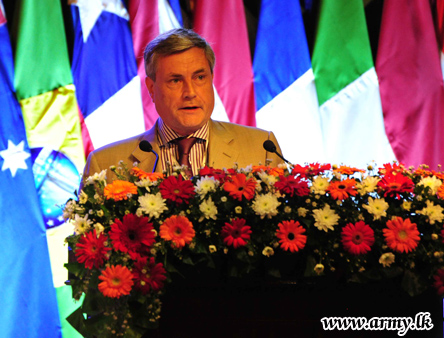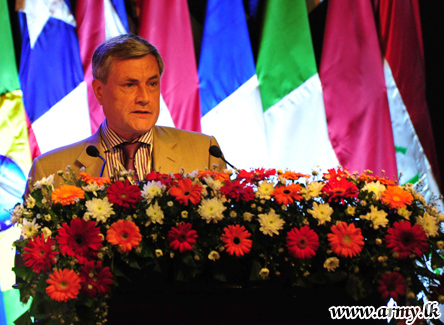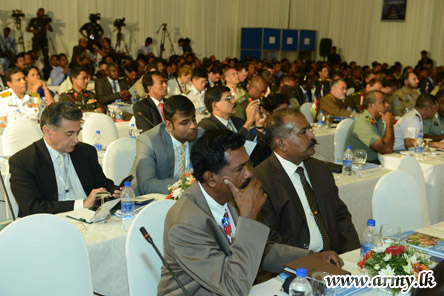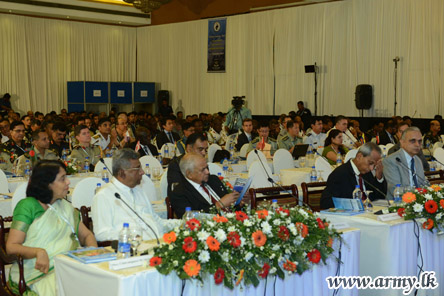Professor Christopher Coker, London School of Economics making his presentation to the ongoing ‘Defence Seminar’ sessions on the ‘Nature of Emerging Global Threats and Impact on National Security’ told the gathering that ‘power politics and security narratives’ in the world theatre have made dramatic changes and the scenario has set new priorities.
Here follow excerpts from his presentation;
Globalisation:
Power Politics and Security Narratives
What is Globalisation: a 19th or 20th century phenomenon?
ï® Global [a 19th century concept]: the unit of analysis became ‘global’ for politics, economics, and social movements
ï® Globalism [a 19th century concept]: the rise of humanitarianism, global consciousness, and concepts of unintended harm (Marx)
ï® Globalisation [a 19th and 20th century concept]: economic integration, interdependence, markets and world trade. The centrality of global capital and the marginalisation of the state
POWER POLITICS NARRATIVES
ï® Global World: Mackinder and the Pivot of World History (1904)
ï® Globalism: New World Orders and Liberal Internationalism: from Woodrow Wilson to George H Bush
ï® Globalisation: Rise of Risk Management
EU Security Doctrine 2003
ï® The Pre-Modern World
ïµ Pre-industrial societies
ïµ Least developed countries
ïµ Examples: Sub Saharan Africa, Afghanistan, etc
ï® The Modern World
ïµ Advanced developing countries (Brazil, Chile, Singapore)
ïµ Transition economies (Kazakhstan)
ï® The Post-Modern World
ïµ OECD countries
ïµ Services based industrial economies
The Pre-Modern World
ï® State Failure
ïµ Somalia 1992/ Lebanon in the 1980s
ïµ Sub-Saharan debt crisis
ï‚« Economic collapse
ï‚« Social and political breakdown
ï‚« Crisis of governance
ï® State Building
ïµ Regime change: Afghanistan/Iraq
ïµ Post Soviet transition countries (Europe, Central Europe, Central Asia)
The Modern World:
why developed economies don’t go to war against each other
ï® The Democratic Thesis: a combination of factors account for this
ïµ Liberal political and economic agenda
ï‚« Values
ï‚« Markets
ï‚« Social and political networks
ïµ Global interdependence
ïµ Systemic factors – multilateralism in policy measures
ïµ Culture of tolerance and civil standards
ïµ Technological factors
ïµ Nuclear weapons as a deterrent
The Post-Modern World:
‘it’s the economy stupid’
ï® Structures of post-modernism
ï® Centrality of economics to voters
ïµ Consumerism
ïµ Information systems (rather than labour)
ïµ Market integration and globalisation
US and Global War on Terror
ï® COLD WAR POST 9/11
ï® New World Order Global Disorder
ï® Defence Security
ï® States Non-state actors
ï® Regimes (NPT) Regime collapse?
ï® ‘Knowns’ Unknowns
RUMSFELD’S LIST INCOMPLETE
ï® The things we pretended not to know (Distance matters) – Russia is back
ï® The things we thought we knew but didn’t (Sectarianism in the Middle East - IS is not al-Qaeda
NARRATIVE (2)
GEOGRAPHY OF EMOTIONS
ï® Appetite/hope (BRICS)
ï® Resentment (Arab world/Russia/Venezuela)
ï® Anxiety (West/Japan)
ï® Culture/Geography
NARRATIVE (3) CYBERSPACE
ï® “The Internet age has been hailed as the end of geography. In fact the internet has a geography of its own ..made up of networks and nodes that process information flows generated and managed from places.”
(Manuel Castells, 2001)
The Return of Great Power War?
ï® Cool War
ï® Code War
ï® Non-linear/hybrid warfare
NARRATIVES IN GENERAL
ï® Be careful of the stories you overheard yourself tell others
ï® Zbig Brzezinski (1998) “What is more important in world history. The Taliban or the collapse of the Soviet empire? Some agitated Muslims or the liberation of central Europe?”
 |
 |
 |
 |

